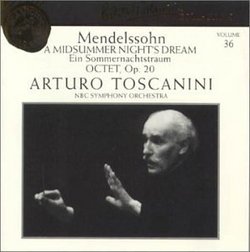| All Artists: Mendelssohn, Toscanini, NBC Title: Midsummer Nights Dream Members Wishing: 0 Total Copies: 0 Label: RCA Release Date: 8/11/1992 Genre: Classical Styles: Chamber Music, Symphonies Number of Discs: 1 SwapaCD Credits: 1 UPC: 090266028320 |
Search - Mendelssohn, Toscanini, NBC :: Midsummer Nights Dream
 | Mendelssohn, Toscanini, NBC Midsummer Nights Dream Genre: Classical
|
Larger Image |
CD Details |
CD ReviewsMagic Mendelssohn Robert E. Nylund | Ft. Wayne, Indiana United States | 02/20/2006 (4 out of 5 stars) "It's astonishing to realize that Felix Mendelssohn (1809-1847) composed the overture to Shakespeare's "A Midsummer Night's Dream" when he was only 17 years old. It is a strikingly mature work with brilliant writing for strings, much in the vein of the series of string symphonies he wrote during his teenage years. There is clearly magic in the overture, as well as the later incidental music he composed for the same classic play. (Erich Wolfgang Korngold arranged this music for Warner Brother's delightful 1935 film version of the play.)
Mendlessohn's writing is at times very delicate and precise, which is so apparent in this 1947 Carnegie Hall recording with Toscanini and the NBC Symphony Orchestra. There is also a relentless energy and drive, typical of Toscanini's conducting, without necessarily overwhelming the listener. In other words, the performance is NEVER heavy-handed, nor does it drag. It is an absolutely brilliant performance, filled with life and vigor. The earlier LP releases of these recordings suffered from RCA's decision to place the microphones far back in the historic auditorium. This frequently resulted in a shallow and distant sound that was particularly troublesome in the sections for the female vocalists and chorus. It was much like sitting in the very back of Carnegie Hall or even out in the lobby; only the louder sections were really clear. So much of the sound was muddy or indistinct. What can be heard today in the recordings is really marvelous. The fact that Toscanini included so much of the incidental music is amazing, since the recordings were made in the 78-rpm era (1947). One would have to listen to the much later recording by Eugene Ormandy and the Philadelphia Orchestra, along with soloists and chorus, to hear more of Mendelssohn's amazing music, also recorded for RCA Victor. The incidental music was written years after the overture, but Mendelssohn managed to match the same magical sound he had achieved earlier. He recogni0zed the mysterious and delightful qualities of Shakespeare's comic play. Mendelssohn even represented Bottom's fate of being turned into a donkey by using a braying sound, particularly during the overture. The scherzo is especially delightful and has more relentless energy than his two recordings with the New York Philharmonic. The nocture, also recorded with the Philharmonic, is quite moving. There is a sadness at times in this music, while other moments have a nobility and dignity that is particularly poignant in Toscanini's hands. The celebrated wedding march has seldom sounded more spectacular and imposing than in this recording. Despite the distant miking, the full effects of this music, complete with clashing cymbals, comes across. During the more lyrical bridge section one can hear Toscanini humming, an example of his deep involvement with the music. Toscanini's recording with the Philadelphia Orchestra of much of the same music comes close to the overwhelming efforts of the NBC Symphony. The vocal sections are much clearer and one can clearly understand the English words, which are actually translated from the German text (a translation from Shakespeare's original text that Mendelssohn used). Overall, this is a very fine performance and has clearly benefited from digital technology. The music of Mendelssohn's Octet, here arranged by Toscanini for the NBC Symphony's celebrated string section, goes well with the overture and incidental music. The scherzo rivals that of "A Midsummer Night's Dream." It is quite a challenge to play this music at the lightning speed requested by Mendelssohn. Here is clear documentation of the fine playing by Toscanini's string players. A former concert cellist, Toscanini never lost his love for the strings and his ability to coax precise and inspired playing for the strings. " |

 Track Listings (10) - Disc #1
Track Listings (10) - Disc #1